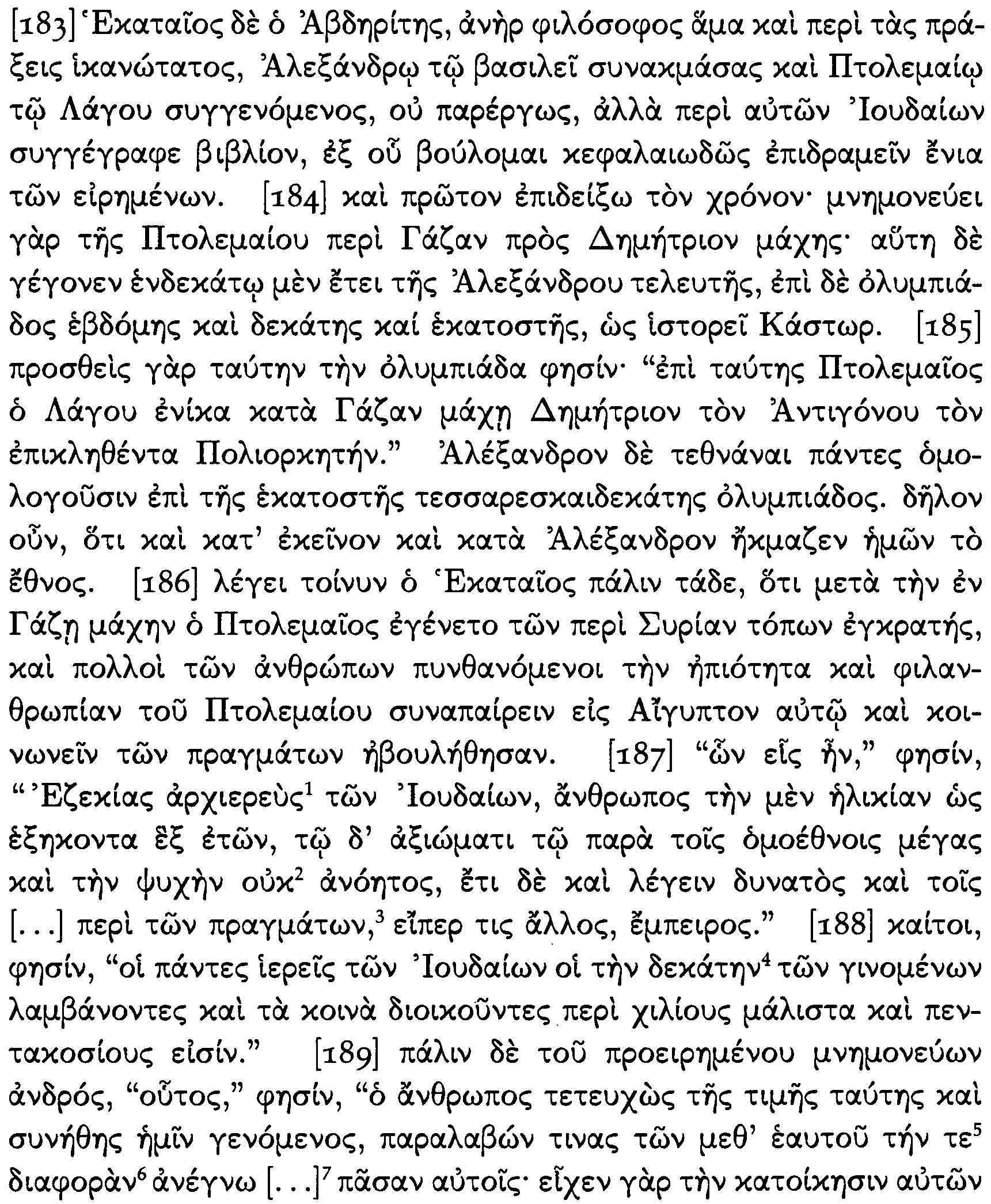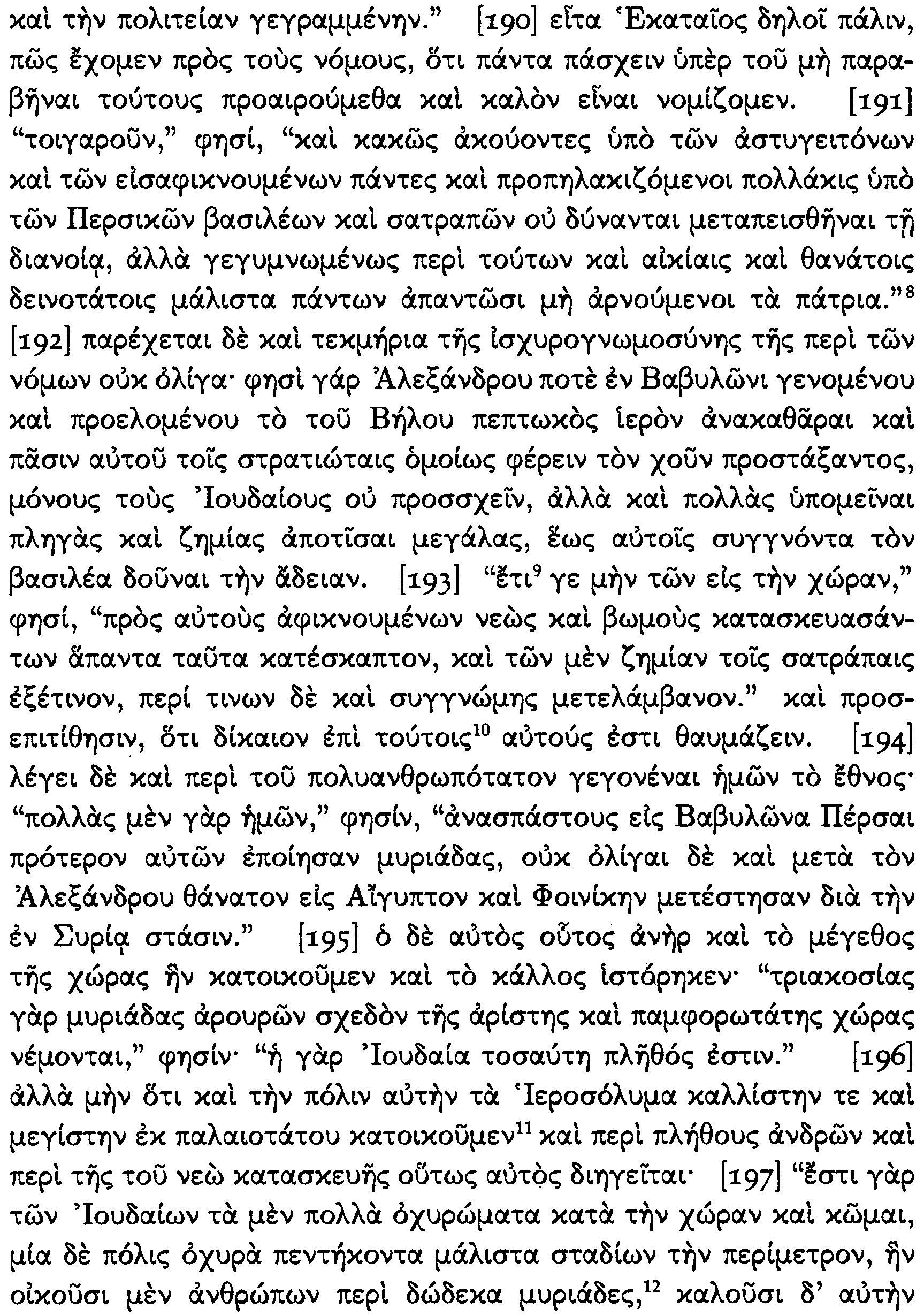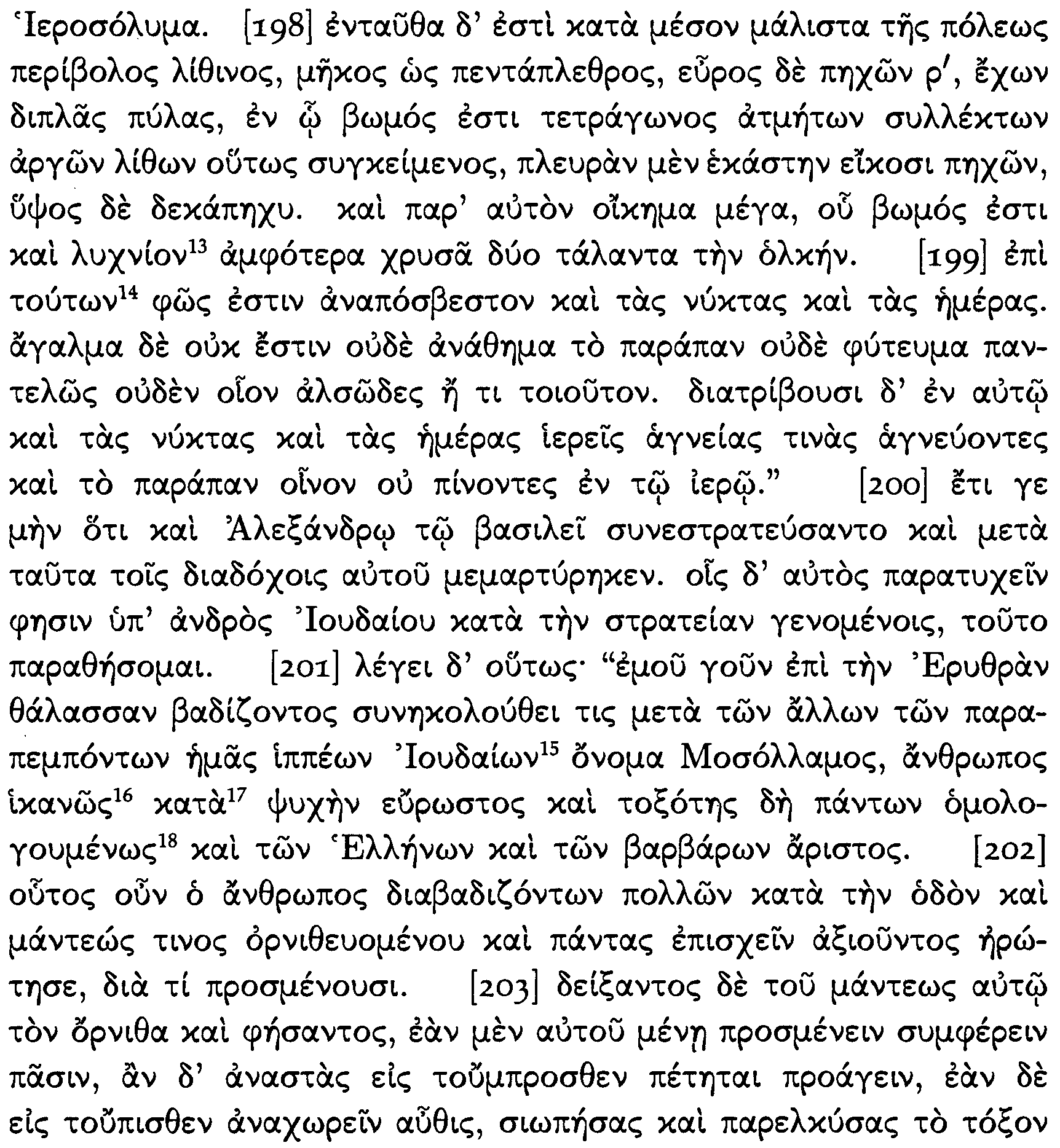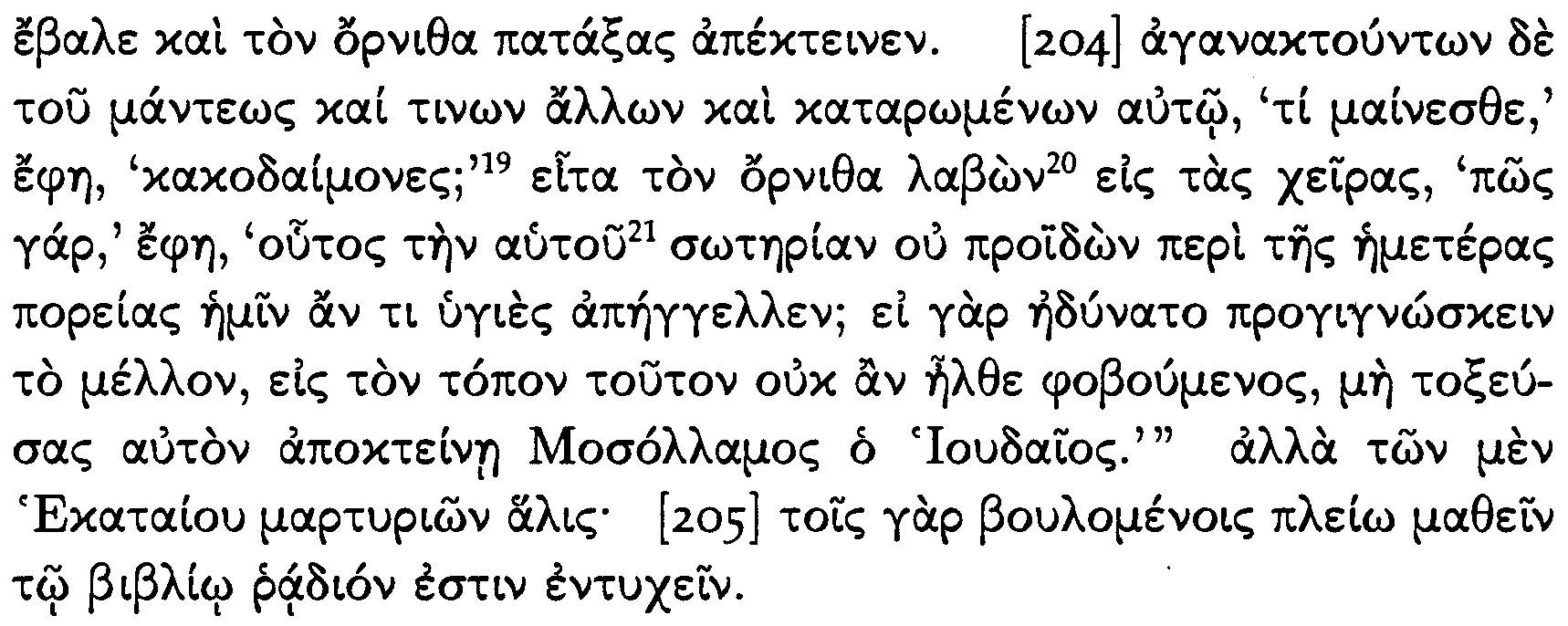II
The Passages in Against Apion: Text and Translation
The passages containing the fragments of and testimonia to the treatise On the Jews appear in Josephus's Against Apion. With one exception, they are grouped together in one sequence in Book I of the work. Josephus prefaces the sequence with a statement about his purpose in referring to the treatise and includes biographical notes about Hecataeus, his date, work, and position. Then come a number of passages, separated by conjunctions and words of introduction by Josephus, some of which appear in direct, others in indirect speech.
The Greek text is reproduced from Niese's edition ([1888] V.33-37). The apparatus is based on Niese's, but it is selective and includes only those readings and emendations that may affect the arguments of this book. In several places I have offered supplements to Niese's apparatus. The sigla refer to the following manuscripts and testimonia:[*]
L | Codex Laurentianus (Florence), plut. 69 cod. 22. Eleventh century. This is the archetype of all extant Greek manuscripts. |
Eus. | Eusebius, Praeparatio Evangelica IX.4.2-9. Eusebius quotes Ap. I.197-204. PE contains also other extracts from Against Apion. Eusebius's readings are often preferable to those of the manuscripts. The most recent critical edition is that of |
* For the evaluation of the manuscripts and the transmission, see further Niese (1888) vol. V, pp. iv ff.; Boysen (1898) p. xxxiv; Thackeray (1926) pp. xvii-xx; Mras (1944) 220ff., (1954-56) vol. VIII, pp. xiii ff., lv ff.; Schreckenberg (1972) 5, 52-53, 79-87; id. (1977) 157-69.
Mras (1956), vol. VIII pp. 489-91. Eusebius's text is extant in thirteen manuscripts. The manuscripts mentioned in my apparatus are: | |
Eusebii cod. G Laurentianus plut. VI cod. 9. Fourteenth century. | |
Eusebii cod. I Venetus gr. 341. Fifteenth century. | |
Lat. | The Latin translation of Against Apion, prepared in the sixth century for Cassiodorus, the minister of Theodoric. Its great contribution consists of the passages II.52-113, which are missing in the Greek manuscripts. There are many mistaken translations, caused by misunderstanding of the Greek text. The translation is extant in three manuscripts. The critical edition used is that of Boysen (1898). |
Ed. pr. | Editio princeps, the first printed edition of Against Apion, in the edition of Josephus by A.P. Arlenius (Basel 1544). It contains readings that may perhaps indicate the use of manuscripts other than L and its apographs. |
For the benefit of the reader who cannot consult the Greek text, I endeavored to translate the texts literally, adhering to their verbal contents and syntactical construction rather than to English idiomatic expressions. This may give the reader of the translation some taste of the style of some of the passages (esp. Ap. I.202-4a).
Jos. Ap. I.183-205

[183] However, Hecataeus of Abdera, a philosopher and at the same time [a man] most competent in practical matters, having flourished at the time of King Alexander and being associated with Ptolemy son of Lagus, [referred to the Jews] not incidentally, but wrote a book about the Jews themselves, from which I want to present the highlights[a] of some of the things said. [184] And first of all I shall establish the date. He mentions the battle of Ptolemy against Demetrius near Gaza. That [battle] took place in the eleventh year after Alexander's death, in the 117th Olympiad, as Castor narrates. [185] For under the head of that Olympiad he says: "In this Olympiad Ptolemy son of Lagus defeated Demetrius son of Antigonus who was called Poliorcetes." And all agree that Alexander died in the 114th Olympiad. It is therefore clear that our nation was flourishing at his [Ptolemy's] time as well as in that of Alexander. [186] Moreover, Hecataeus goes on to say this: "After the battle at Gaza Ptolemy became master of the places near Syria,[b] and many of the men, hearing of his kindness and humanity [philanthropia ] wished to accompany him to Egypt and take part in the affairs [of the kingdom]." [187] "One of them," he [Hecataeus] says, "was Hezekiah, High Priest of the Jews, a man at the age of around sixty-six, highly thought of by his compatriots and not unintelligent in his mind, and, moreover, an able speaker, and in [... and][c] experienced, if indeed anyone was, in the affairs." [188] He also says: "And all the Jewish priests who receive the tithe of the produce and administer public matters number at most about one thousand five hundred." [189] And again, referring to the above-mentioned man: "This man," he says, "having obtained this authority and being well acquainted with us, assembled some of his men and read to them the whole advantage.[d] For he possessed in writing their
[b] Possibly also "master of the places in Syria" or "master of Syria."
[d] If my suggestion for the lacuna (n. 7) is to be accepted, the translation of sentence would be: "He assembled some of the men and pointed out to them the advantage and read to them the whole á "decree"? "charter"?ñ . For he possessed...."

settling and constitution." [190] Then Hecataeus in turn explains how we regard the laws, that we prefer to suffer everything in order not to transgress against them and [that] we consider it as virtuous. [191] "So for example," he says, "all being insulted by their neighbors and by those who came into [the country], and being frequently abused by the Persian kings and satraps, they could not be persuaded to change their way of thinking, but being exposed because of [their adherence to] them [the laws], they faced tortures and the most horrible deaths rather than deny their ancestral [laws]." [192] He provided not a few proofs for the resolute mind with regard to the laws. For he says that once when Alexander was in Babylon and proposed to clear away [the rubble of] the ruined temple of Bel, and ordered all the soldiers alike to carry the earth material, only the Jews did not apply themselves to [it], but submitted to many floggings and paid heavy penalties, until the king agreed to grant them indemnity. [193] He says yet further: "they destroyed all the temples and altars constructed by those coming to the land against them, for some of which they paid a fine to the satraps, and for others they obtained forgiveness." And he adds that it is just to admire them for these [actions]. [194] And he also relates how our nation became overpopulated. "The Persians," he says, "had formerly deported many tens of thousands of them to Babylon, and after Alexander's death, no less immigrated to Egypt and Phoenicia because of the turbulence in Syria." [195] And this man himself also recorded the size of the land in which we live and its beauty. He says: "They possess almost three hundred myriads of [i.e., three million] arourae of the best and most fertile land for all products. Such is the extent of Judea." [196] Indeed he thus also relates that we inhabit Jerusalem, that city, the most beautiful and the greatest, from time immemorial, and the same [man relates] thus about the great number of people and the building of the temple: [197] "There are many fortresses of the Jews throughout the country, as well as villages, but only one fortified city, of about fifty stadia [in] circumference, which is inhabited by about twelve myriads of [i.e., 120,000] people,

and is called by them Jerusalem. [198] There is there, nearly in the center of the city, a stone wall, five plethra long, and a hundred cubits wide, having double gates, inside which there is a square altar, not of hewn, but of collected, unwrought stones, so constructed: twenty cubits long and ten cubits high, and beside it a great edifice where there is an altar and a lamp stand, both covered with gold and weighing two talents. [199] Upon these[e] there is a light that is never extinguished night and day. And there are no statues, nor any votive offerings, and absolutely no plants, resembling neither a grove nor anything similar. And the priests pass their time night and day in it purifying themselves by certain [rituals] of purification and entirely abstaining from wine in the temple." [200] And he further testifies that they served as soldiers under King Alexander, and afterward under his successors. And the [actions] performed by a Jewish man, which he witnessed after he was on an expedition, I shall cite as well. [201] Now he says thus: "Anyway when I was marching to the Red Sea, a certain Mosollamus was accompanying us, together with the rest of the Jewish[f] cavalrymen who served us as an advance force. [Mosollamus was] a man with a robust mind,[g] and, as agreed by all, the best archer among Greeks and barbarians. [202] So that man, when many went to and fro along the road, and a certain seer was watching the flight of the birds, and he [the seer] requested all of them to abstain [from all actions], asked why they were halting. [203] The seer having pointed out the bird to him, and saying that if it [the bird] stays there, it is expedient for all to wait still longer, and if it rises and flies ahead, to advance, but if [it flies] behind, to withdraw at once,
[e] Possibly "this": see the apparatus and p. 163 below.
[f] Niese's emendation, "a certain Jew together with the rest of the cavalrymen," is unnecessary, and was suggested before the discovery of the Elephantine papyri, as well as material testifying to the service of Jewish units (including cavalry) in the Persian and Ptolemaic armies.

Jos. Ap. II.43

he [Mosollamus], after keeping silence and drawing his bow, shot and, hitting the bird, killed [it]. [204] When the seer and some others became irritated and called down curses upon him, he [Mosollamus] said: 'Why are you raving, [you] wretches?'[h] Then, taking the bird in his hands he said: 'How, then, could this [bird], which did not provide for its own safety, say anything sound about our march? For had it been able to know the future, it would not have come to this place, fearing that Mosollamus the Jew would draw his bow and kill it.'" [205] But this should suffice concerning the evidence of Hecataeus. To those who want to learn more, the book is readily available.
For he [Alexander the Great] honored our nation, as Hecataeus says about us, that because of the fairness and loyalty shown to him by the Jews, he [Alexander] annexed the land of Samaria to them free of tribute.